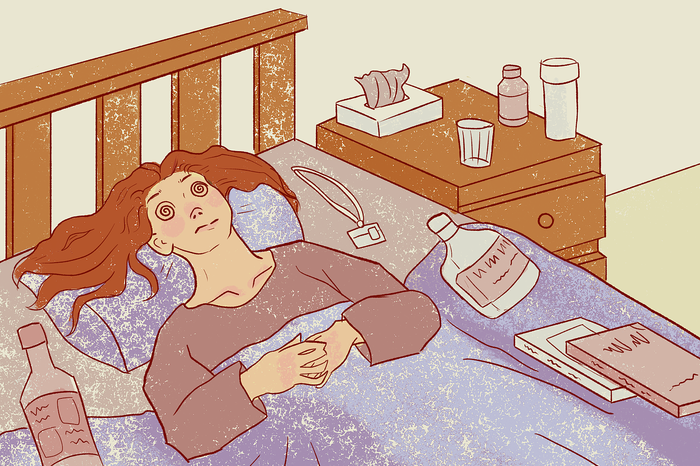Stay cold to treat a cold?
Tabbie Tatton-Brown explains the paradox of your winter sniffles

Many European languages refer to the viral infection of the upper respiratory tract (i.e. a cold) in a way that references cold weather. For example, in Danish the term for these symptoms is ‘Forkølelse’ which literally translates as ‘too cold’, whilst the Dutch ‘Verkouden’ translates as ‘to make cold’. These different terms reflect the strong association between cold winter months and the increased prevalence of ‘cold-like symptoms’, which include a runny nose, sore throat, and cough. However, the cold temperatures of winter aren’t directly responsible for your runny nose and, although the advice we were given as children was to ‘wrap up warm to prevent a cold,’ we might actually benefit from doing the opposite.
This was illustrated in an investigation where a group of volunteers were made to take a bath and then stand, dripping wet, for 30 minutes. They were then made to wear wet socks for several hours. These individuals did not show an increased susceptibility to getting a cold compared to a control group of warm volunteers, despite the former showing a drop in body temperatures.
“crowded spaces which lack open windows provide the perfect environment for their spread - something to think about the next time you are squashed onto the top floor of Revs”
Instead, a likely explanation for the increased numbers of cold-ridden individuals in the winter-months is that more people spend a larger amount of time in unventilated rooms when the temperatures are lower. Given that respiratory viruses tend to spread as droplets in the air or on contaminated surfaces, crowded spaces which lack open windows provide the perfect environment for their spread - something to think about the next time you are squashed onto the top floor of Revs!
Whilst radiators or wood-burning stoves provide welcome warmth in the colder months, these also increase your susceptibility for getting a viral infection. This is because the air in rooms which are heated tends to be dryer. Dry air is damaging to the mucous membranes in your nose and throat which trap viruses to prevent them from entering and infecting your respiratory tract. Droplets containing viruses also travel further distances in lower humidity, making the dry, stagnant air indoors a perfect breeding-ground for the spread of viruses.
Therefore, somewhat paradoxically, the best way to prevent getting your next cold may be to embrace the cold, rather than being cocooned in warmth. By opening windows and turning off radiators, you are protecting your mucosal membranes and decreasing the risk of infection. In fact, there is some preliminary evidence to suggest that exposure to the cold actually increases the efficiency of your immune system. One study showed that frequent cold-water immersions led to a small but statistically significant increase in the number of some white blood cells that make up the immune system. So, perhaps taking a cold shower each morning might increase the chances of avoiding getting ill this winter?
“Droplets containing viruses travel further distances in lower humidity, making the dry, stagnant air indoors a perfect breeding-ground for the spread of viruses”
Another potential reason why people become ill more often in the winter months is that when the days are shorter and people spend more time indoors, they are not exposed to enough sunlight, and may therefore develop a vitamin D deficiency. Vitamin D, which can be obtained from sunlight exposure and some foods (e.g. oily fish, eggs, meat), plays an important role in regulating immune system function. A weakened immune system makes you more susceptible to viral infection. Therefore, spending more time outside in the sun, eating foods that are vitamin D rich or taking vitamin D supplements could help strengthen your immune system.
Above all, the best way to decrease your chances of catching a cold this winter is to make sure you practice good hygiene and have a healthy lifestyle. As we’re all aware following Covid, it is important to wash hands and surfaces regularly. Getting enough sleep is also very important for an optimally functioning immune system. I’m sure you or your friends experienced ‘freshers’ flu’ after freshers’ week; a lack of sleep is likely a large contributor to this infamous illness.
Therefore, the next time somebody tells you that you are not going to be warm enough and will catch a cold, you can politely inform them that you are, in fact, likely strengthening your immune system and decreasing your chances of illness. Rather than staying indoors, it might be better for your health to focus on having a healthy diet and cutting out 3am study sessions.
 News / CUP announces funding scheme for under-represented academics19 December 2025
News / CUP announces funding scheme for under-represented academics19 December 2025 News / SU reluctantly registers controversial women’s soc18 December 2025
News / SU reluctantly registers controversial women’s soc18 December 2025 News / Cambridge welcomes UK rejoining the Erasmus scheme20 December 2025
News / Cambridge welcomes UK rejoining the Erasmus scheme20 December 2025 Features / Should I stay or should I go? Cambridge students and alumni reflect on how their memories stay with them15 December 2025
Features / Should I stay or should I go? Cambridge students and alumni reflect on how their memories stay with them15 December 2025 Film & TV / Timothée Chalamet and the era-fication of film marketing21 December 2025
Film & TV / Timothée Chalamet and the era-fication of film marketing21 December 2025










